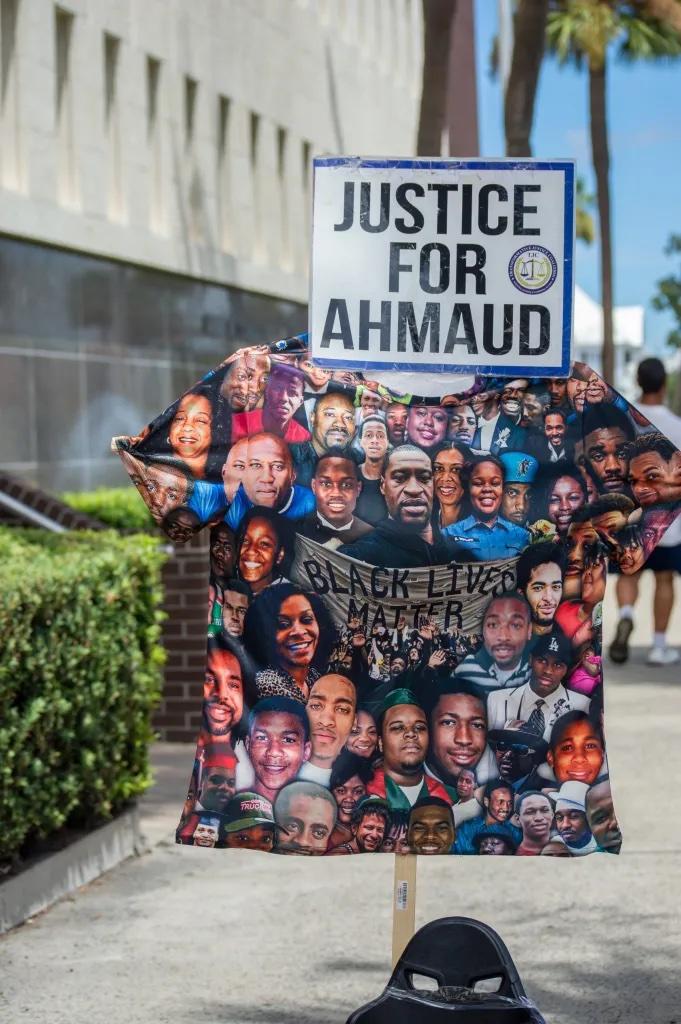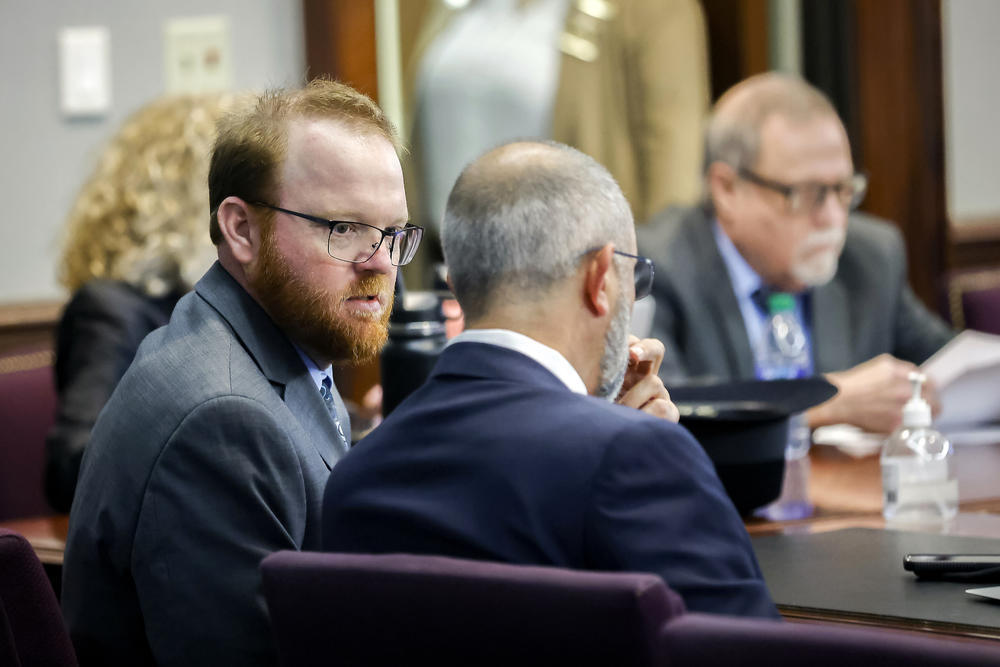
Caption
From left: Gregory McMichael, Travis McMichael and William "Roddie" Bryan were found guilty of hate crimes in the February 2020 slaying of 25-year-old Ahmaud Arbery.

From left: Gregory McMichael, Travis McMichael and William "Roddie" Bryan were found guilty of hate crimes in the February 2020 slaying of 25-year-old Ahmaud Arbery.
Jake Shore, The Current
The three white men convicted of federal hate crimes for killing Black jogger Ahmaud Arbery are appealing those convictions, according to briefs filed last week in the 11th U.S. Circuit Court of Appeals.

Sign outside of the federal courthouse in Brunswick during the sentencings of the men convicted of hate crimes for killing Ahmaud Arbery on Aug. 8, 2022.
Their convictions, the first successful federal hate crimes prosecutions in Georgia, came after the three men were found guilty of murder in state court. They are currently serving life sentences in Georgia state prisons.
Attorneys for Glynn County residents Gregory McMichael, his son Travis McMichael, and former neighbor William Bryan, filed their appeals citing legal arguments they had made in the original federal trial: They argue that race didn’t factor into their clients’ motives for hunting and murdering Arbery.
What Gregory McMichael considered when deciding to chase Arbery was that Arbery had previously “illegally” entered a house under construction, not his race, according to attorney A.J. Balbo of Richmond Hill.
“The fact that Mr. Arbery was Black was merely a characteristic shared with the person seen on the security footage, a fact of no greater import to Gregory McMichael’s calculus than Mr. Arbery’s biological sex, the shorts he was wearing, his hairstyle, or his tattoos,” he wrote in the Mar. 3 filing. “Mr. Arbery’s race was only relevant because it matched the race of the man on the home security footage.”
Arbery, a 25-year-old Brunswick man, was out on a run in Satilla Shores on Feb. 23, 2020, when Gregory McMichael spotted him, grabbed his revolver and called for his son, Travis, to pursue the Black man. Bryan joined the chase, recording a now-infamous video. Travis McMichael ultimately shot and killed Arbery during a struggle.
Federal prosecutors have not yet responded to the briefs. But in a February 2022 trial, they disagreed by providing evidence of the men’s previous racial attitudes, like repeated use of the N-word, calling Black people “monkeys,” and, in Gregory McMichael’s case, stating “all these [B]lacks are nothing but trouble; I wish they would all die,’” when referring to a deceased civil rights leader.
A federal jury convicted the men on Feb. 22, 2022 of infringing Arbery’s civil rights. The trial was “a public airing of the truth,” according to Assistant U.S. Attorney Tara Lyons at the men’s sentencing, as much of the evidence of racial animus was excluded from their state trial.
Their state trials focused solely on whether they murdered Arbery. A Glynn County jury found the men guilty on Jan. 7, 2022. Their attorneys have filed motions for new trials in Glynn County, but no documents supporting those motions — which would move the appeal forward — have been filed as of Wednesday.

Travis McMichael, left, speaks with his attorney Jason B. Sheffield , center, during his sentencing, alone with his father Greg McMichael and neighbor, William "Roddie" Bryan in the Glynn County Courthouse, Friday, Dec. 7, 2022, in Brunswick, Ga. The three were found guilty in the February 2020 slaying of 25-year-old Ahmaud Arbery.
Travis McMichael’s 81-page federal appeal focuses mainly on whether or not the Satilla Shores streets where Arbery was killed should be considered public roads.
The technical legal argument by his attorney Amy Lee Copeland of Savannah seeks to undercut the foundation of the federal charges against Travis McMichael.
For Travis McMichael to have interfered with Arbery’s federally guaranteed rights, the interference has to have occurred when Arbery was “participating in or enjoying any benefit, service, privilege, program, facility, or activity provided or administered by a State or subdivision thereof,” according to federal law.
Copeland argues that the streets of Satilla Shores, a small subdivision, were never officially established as public roads.
Just as in the past two criminal trials, Bryan has sought to separate himself from the McMichael father and son’s actions.
Bryan joined in the chase of Arbery once the pursuit led directly to the front of his Satilla Shores home, the appeal states. He did not fire a weapon but did assist in blocking Arbery with his truck at one point in the chase.

William "Roddie" Bryan
But federal prosecutors introduced evidence of his past racist statements, similar to that introduced with the McMichaels and some of which occurred within the same month of Arbery’s death.
In text messages and social media posts presented at trial, he used the N-word seven times, “bootlip” and “monkeys” twice each, when describing Black people. He disapproved of his daughter dating a Black man. In February 2020, Bryan texted his sister that his daughter “has a n****r now.”
His attorney J. Pete Theodocion, of Augusta, argued that this evidence was inflammatory and did not show Bryan’s decision to chase Arbery in that moment was race-based.
“Every crime committed against an African American is not a hate crime,” the attorney wrote. “Every crime committed against an African American by a man who has used racist language in the past is not a hate crime.”
Theodocion said Bryan was not “a man who saw the world through a prism of racism.”
“Indeed, his texts and social media showed a man who used the ‘n word’ barely once a year, and who was never known once in his life to be unfriendly, much less hateful, toward a Black person,” he said.
This story comes to GPB through a reporting partnership with The Current.